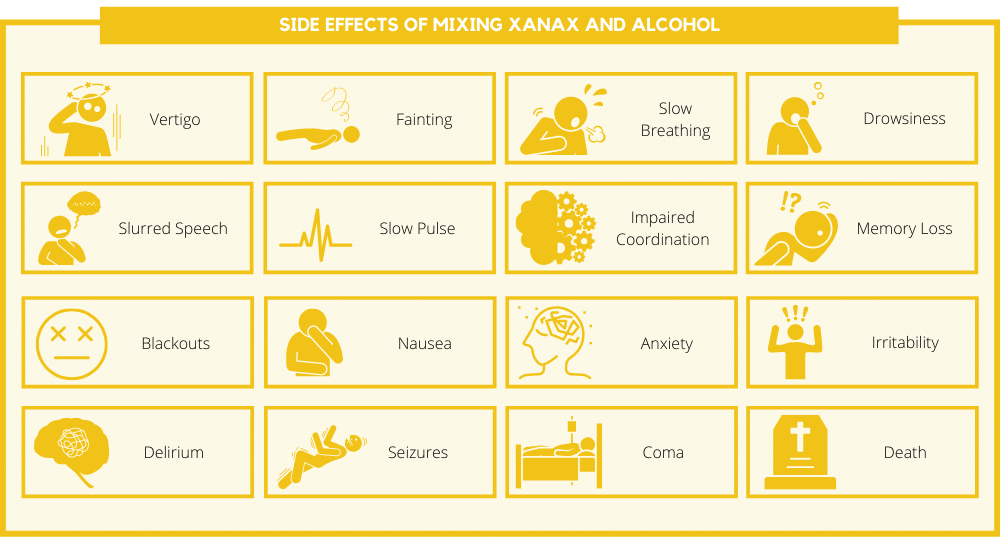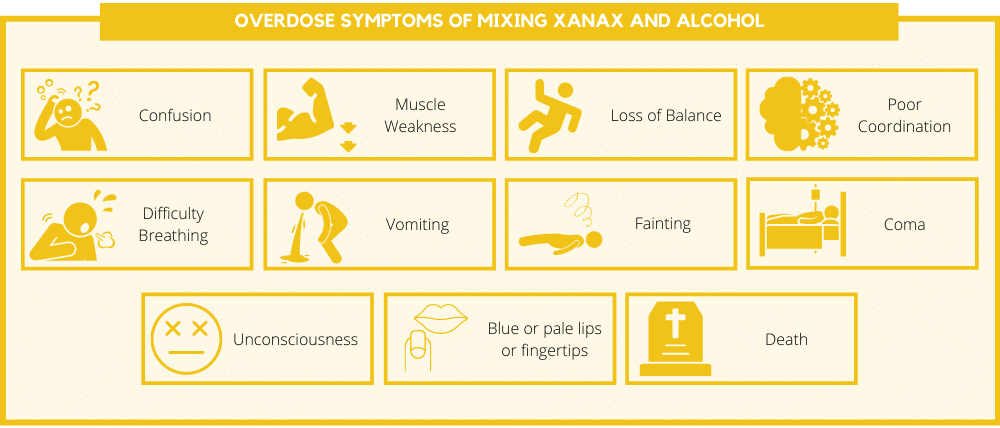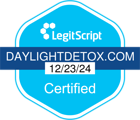People who are prescribed Xanax are usually instructed to limit their alcohol intake. This is because of the known interaction between the two substances. Xanax and alcohol affect the same areas of the brain and depress the central nervous system. When abused, they can produce serious adverse side effects, some of which are potentially fatal.
Still, Xanax and alcohol are a popular combination among drug users and alcoholics due to the enhanced feelings this mixture of substances can produce. Mixing alcohol and Xanax is extremely dangerous and increases the risk of addiction, overdose, and adverse health effects.

What Happens When You Combine Alcohol and Xanax?
Xanax is a prescription benzodiazepine medication that increases the production and reuptake of gamma-aminobutyric acid (GABA) and dopamine in the brain. An increase in GABA and dopamine produces relaxing, sedating, and tranquilizing effects as well as a mild euphoria.
Alcohol, similarly, increases the concentration of GABA, dopamine, and serotonin. In other words, the mechanism of action of both Xanax and alcohol is similar and they produce the same type of depressing effects on the central nervous system. In low doses, alcohol produces energizing effects which make people feel stimulated and happier.[2] However, as the concentration of alcohol in a person’s blood begins to rise, he or she will begin feeling sedated or relaxed.
When combined with Xanax, people feel the depressant effects of alcohol faster than they normally would. Rather than feeling stimulated and energized after one or two drinks, someone who has also taken Xanax may feel very drunk, intoxicated, and even sedated. This is because both substances increase the effects of the other by acting on the same areas of the brain.
Due to the inhibitory nature of both substances, mixing Xanax and alcohol is extremely dangerous as it can lead to poor decision-making, blackouts, accidents, and more.
Side Effects of Mixing Xanax and Alcohol
When combined, these two substances reduce brain activity and slow down signals sent throughout the central nervous system. The relaxing effects of both substances increase the effects of the other, producing a variety of concerning and potentially life-threatening side effects.
Symptoms and side effects caused by mixing alcohol and Xanax include:

- Vertigo
- Fainting
- Slow breathing
- Drowsiness
- Slurred speech
- Slow pulse
- Impaired coordination
- Memory loss
- Blackouts
- Nausea
- Anxiety
- Irritability
- Delirium
- Seizures
- Coma
- Death
The combination of Xanax and alcohol can produce sedating and synergistic effects. Individuals using both substances will feel reduced anxiety, decreased motor reflexes, and lethargy.
Individuals who consume more alcohol than Xanax are likely to pass out quickly or become unconscious. On the other hand, people who consume more Xanax than alcohol may be prone more to euphoria or irrational behaviors.
Dangers of Mixing Xanax and Alcohol
When two depressants such as Xanax and alcohol are mixed, activity in the central nervous system slows down to a dangerous rate. Oversedation can occur and lead to overdose, alcohol poisoning, or death. Xanax intensifies the side effects of alcohol and alcohol intensifies the side effects of Xanax.
In high doses, areas of the brainstem that control automatic life functions like breathing, respiration, and heart rate get shut off. This is when overdose, coma, or death occurs.
Symptoms of an overdose include:

- Confusion
- Muscle weakness
- Loss of balance
- Poor coordination
- Difficulty breathing
- Vomiting
- Fainting
- Coma
- Unconsciousness
- Blue or pale lips or fingertips
- Death
Both drugs, when combined, produce synergistic effects that result in decreased blood flow to the brain. This increases inhibitory neurotransmitters like GABA. As the effects of these substances take hold, significant issues with critical thinking, reasoning, self-control, problem-solving, and judgment may appear. The more alcohol and/or Xanax is consumed, the stronger these effects become.
People may experience blackouts where they are unable to remember entire blocks of time while under the influence. During this time, they may make poor decisions like driving while intoxicated or other illegal behaviors. Individuals may also get into accidents or engage in unprotected sex.
Other dangers associated with mixing Xanax and alcohol include:[3]
- Extreme sedation
- Increased potential for liver or kidney damage
- Risk of psychosis or neurological effects
- Increased risk of developing physical dependence and/or addiction
- Risk of aggression or irritability towards others
In the long term, this drug combination can increase a person’s risk for the following conditions:
- Changes in appetite and weight
- Cognitive and memory impairments
- Decreased sex drive
- Depression
- Liver damage or failure
- Personality changes
- Certain types of cancer
- Heart disease and/or stroke
Taking high doses of Xanax and alcohol together can be fatal. Fatalities regarding alcohol and Xanax are far higher than they are with each individual drug alone.[4]
Find Help Today
Xanax and alcohol are both highly addictive substances that become even more dangerous when mixed together and abused. If you or someone you know is struggling with an addiction to either or both of these substances, it’s important to get help as soon as possible.
It is not easy to regulate how much Xanax or alcohol you are consuming while under the influence of the substances, making it easy to overdose and experience other consequences. Here at Daylight Recovery Center, we want to help you before these substances permanently affect your life.
Between our medical detox program, residential treatment services, and discharge planning, we can help you live a life that is free of addictive substances. Don’t wait any longer. Contact us today for help.



